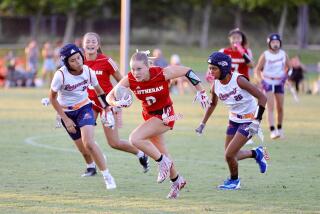Unstable Situation
- Share via
IRVINE — Eleven-year-old Marie King planted her feet firmly in the hay-strewn dirt as a horse named Boe towered above, wrapping his long neck around her and nuzzling her cheek.
“I just got him last Tuesday,” King announced, adjusting a green velvet riding helmet. “He’s a wonderful horse. He has a wonderful stride. I’m very excited. This is my first horse and I feel ready for the responsibility ahead.”
But that wonder could be short lived. UC Irvine plans to pave Boe’s pasture for a new student center. Within a year, his stable will be bulldozed and the dirt King stood on will be under a parking lot.
For nearly a quarter century, piebalds and palominos, retired workhorses and pedigreed pets have run free in 75 acres of natural grassland owned by the university. Cooperatives run by 4-H clubs and the WHOA (Wilderness Horseowners Assn.) riding club have fed and cared for five dozen horses, which may be the last free-range horses in Orange County. Although each horse is individually owned, over the years they have formed natural herds.
“They have the opportunity here to behave like normal animals. It’s just gorgeous in springtime, when they all run,” said Cora Burn, watching her red quarter horse, Whisper, trot to the watering trough after a swaybacked old Hollywood show horse named Dimitri. “Their idea of fun is nip and tuck, bump and grind and carry on. This is the last place they can pasture in Orange County. They just don’t have this kind of space anywhere anymore.”
But plans for a new student recreation center that would be the hub of a 10-year expansion plan could put an end to their roll in the clover, or in this case, thorny, wild artichoke-filled chaparral. With UCI’s student population swelling annually, and plans to provide housing for up to 40% of the students in coming years, university officials say the change has to happen.
“They were always interim facilities provided rent-free with the understanding that they would be developed someday,” said Chuck Pieper, associate vice chancellor of student affairs.
Scheduled to depart sometime after the horses, to make way for a new road, are several hundred goats, pigs and ducks and a group of weather-beaten stalls owned by two 4-H clubs next to the stables.
“They make it sound so simple to just pack up,” said Brad Champion, 14, who has nursed his pet pig Bertha from infancy to a healthy 128 pounds in four months. “It took a lot of hard work to build this place. It isn’t made out of Popsicle sticks. It didn’t happen overnight.”
Livestock owners, their parents and UCI officials are negotiating to see if alternative land can be found, but the outcome is far from certain, and time and funds are short. WHOA treasurer Leigh Richards and campus grounds personnel toured a proposed site on top of a nearby hill this week. But club members, accustomed to paying just $30 a month for utilities and water, would have to raise $100,000 to $200,000 for grading, access to the land, new stables and utility hook-ups, all to be done before next November when they must move out.
“What it really comes down to is money, pending proper university approvals,” Pieper said.
Richards and other owners are trying to remain optimistic, casting about for a generous UCI alumnus or area businessperson who loves horses.
“We’ll name our pasture anything they want. We’re going to have a riding arena, they can name that too,” Richards said.
The 4-H members say they are behind on fund-raising and relocation efforts, because 4-H county administrator Anne Cotter never told them that she had been informed in February about the eviction.
*
“There was miscommunication,” said Roger Richardson, whose daughter went through the 4-H program, and who continues to be actively involved.
Cotter did not respond to phone calls, but 4-H program director Mike Mann said 4-H would continue to sponsor livestock activities for kids if an alternative site was found, but didn’t want to be involved in the site search, building or fund-raising.
After learning of the eviction from their WHOA neighbors, Richardson and others formed a club affiliated with the university, rather than 4-H, and hastily submitted a proposal to match WHOA’s plan to move to the hilltop.
“We have contractors whose kids are members, and who would donate work to the site,” Richardson said. “Hopefully, we can make it happen in time.”
Even if a new site is found, university officials note that any other land loaned to the groups also will be developed in coming years.
If the money isn’t raised, owners will have to find new stables somewhere. And owners say private stables in Orange County already are overcrowded.
“I think it’s very, very sad--for the horses and for us,” said WHOA member Kathy Whitson, who also teaches 4-H children to ride.
But members are hoping that doesn’t happen.
“We’re secretly hoping with all the daggoned land they’ve got, they could find another place to put us permanently,” said Whisper’s owner, Burn.
More to Read
Sign up for Essential California
The most important California stories and recommendations in your inbox every morning.
You may occasionally receive promotional content from the Los Angeles Times.










